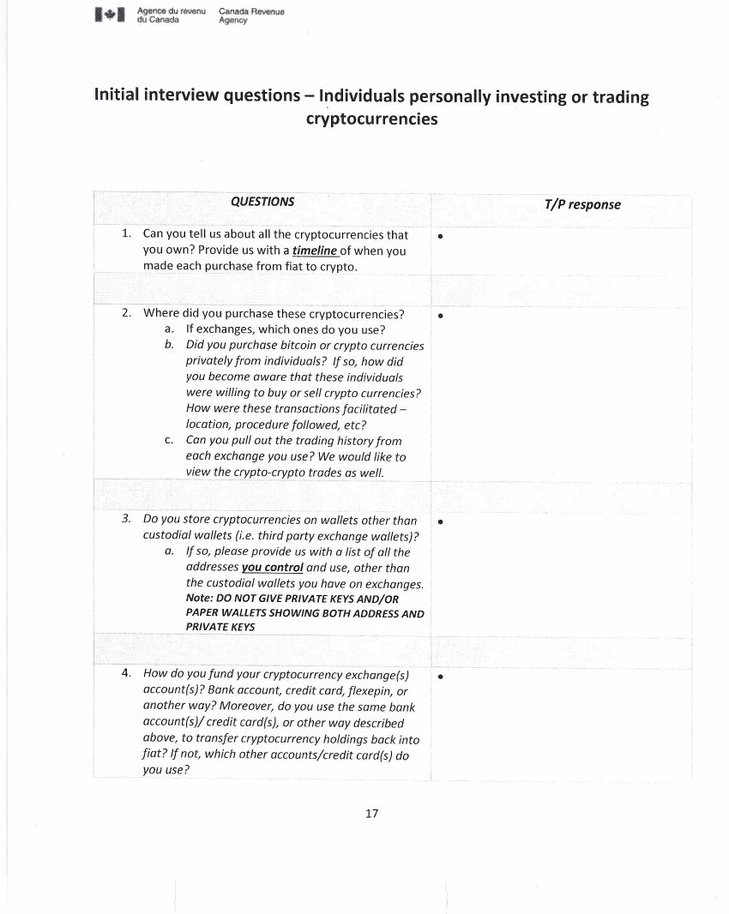
The Canada Revenue Agency (CRA) has sent an extremely detailed questionnaire to citizens it believes to be in possession of cryptocurrency. Those suspected of failing to disclose the full extent of their holdings have been asked whether they use a cryptocurrency mixing service, and if so, why. They’ve also been asked to provide the full tracing history of any transactions that have passed through a bitcoin tumbler.
Also read: A Forensic Analysis of Blockchain Surveillance Companies
CRA Poses Some Very Probing Questions
A number of Canadian cryptocurrency holders have reported receiving a detailed questionnaire from the CRA. The request, Forbes reports, is part of a deep audit into the behavior of bitcoin-holders that looks back several years into their transactional history. Tax investigations of cryptocurrency users are becoming commonplace, but the nature of some of the questions posed by the CRA have set alarm bells ringing for Canadian cryptocurrency holders.
One set of questions in particular has caused quite a stir. The CRA asks:
Do you use any cryptocurrency mixing services and tumblers? If so, which services do you use? Can you please provide us with the tracing history, along with all the cryptocurrency addresses you ‘mixed’? Why do you use these services?
While the tax agency’s reasons for quizzing the use of mixing services is obvious, given that they can be used for money laundering and tax evasion, these tools are not illegal and are popular with privacy-conscious bitcoiners. Volunteering the “tracing history” of coins passed through a mixer would defeat the whole point of the exercise, and erode any privacy gains that had temporarily been made. It would also be technically difficult, if not impossible, depending on the cryptocurrency and mixer in question.

Earlier this week, news.Bitcoin.com reported on blockchain forensics firm Crystal, owned by Bitfury, which promises to “evaluate and compare the likelihood of blockchain participants’ association with known ‘bad actors’.” One such “bad” service it mentioned in this respect was bitcoin mixers.
Enhanced Scrutiny for the ‘Crime’ of Owning Cryptocurrency
The journalist who broke the Canadian tax investigation story has shared images of the questionnaire sent to individuals who have been subjected to a CRA audit. Other questions in the audit include whether the individual uses Shapeshift or Changelly, and if so, which crypto addresses they’ve used to exchange assets, and the date when this occurred.


Federal agencies such as the CRA are entitled to audit individuals to determine whether they have fully disclosed and paid their tax obligations in full. It follows that crypto assets should be treated no differently to any other form of wealth in this respect. Nevertheless, the depth and breadth of the questions posed to the Canadian citizens targeted is more extensive than anything previously perpetrated by other crypto-savvy agencies such as America’s IRS.
In a statement provided to Forbes, the CRA explained that it is “committed to helping taxpayers understand their tax obligations when using digital currencies, and to remind them that using digital currency does not exempt consumers from their tax obligations.” Despite financial crimes involving cryptocurrency having been shown to be proportionally lower than those involving fiat currency, bitcoiners are increasingly singled out for enhanced scrutiny from government agencies.
What are your thoughts on the CRA’s audit of cryptocurrency owners? Let us know in the comments section below.
Images courtesy of Shutterstock and Kyle Torpey.
Need to calculate your bitcoin holdings? Check our tools section.
Previous Articles:
- Chainalysis Addresses User Data Policies Following Coinbase’s Comments
- Celer Network to List Next on Binance Launchpad, Promises ‘Internet Scaling’ for All Blockchains
- Binance’s Crypto BNB No Longer Tracks Bitcoin – And That’s a Big Deal
- 1.3 Million Leaked Transactions Link Major Banks to $8.8 Billion Money Laundering Scheme
- IBM’s X-Force Red Team Rolls Out Blockchain Security Testing Service
